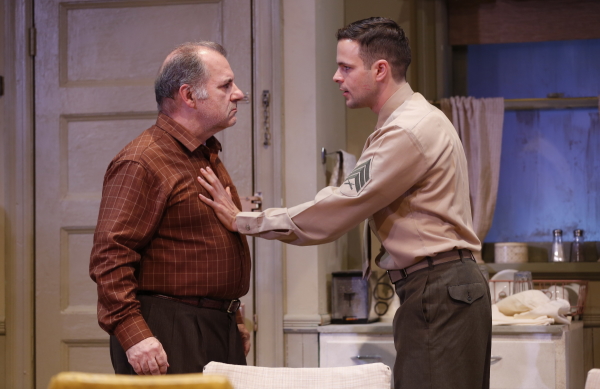Almost Home
Vietnam veteran Walter Anderson makes his playwriting debut with an exploration of military life after the battlefield.

(© Carol Rosegg)
When Johnny comes marching home again
Hurrah! Hurrah!
We'll give him a hearty welcome then
Hurrah! Hurrah!
In war folklore, Johnny's story ends at his homecoming. What he and his welcome wagon do after the pomp and circumstance grinds to a halt is the more ambiguous subject of Vietnam veteran Walter Anderson's playwriting debut, Almost Home, now running at Theatre Row's Acorn Theatre. With an archive of personal experience at his disposal, Anderson implicitly promises unique insights into these enigmatic post-glory days. While he delivers an engaging one-act drama with flashes of compelling humanity, the unexplored depths of Johnny — the so-called all-American hero — are left disappointingly unmined.
Jonny Orsini inserts an "h" into his name and becomes our fresh-faced Marine, Johnny Barnett. The Bronx native is just home from Vietnam with only a minor wound to his arm but more than enough mental scars. Removed from the immediate horrors of combat, the reformed hoodlum must choose one of three distinct trajectories for his post-war career. Behind door number one: a position as a Marines drill instructor; number two: a college education; and three: a career on the Bronx police force. Johnny returns home excited about the intellectual possibilities behind door number two, but is coerced into considering number three when he becomes a bargaining chip between his money-squandering father and a blackmailing cop.
Anderson pinpoints an interesting struggle — common to veterans of any generation — to explore in his inaugural play. Yet rather than allow his protagonist to organically careen off the rails of these diverging paths, he gives Johnny an unconvincingly clearheaded voice to vocalize this search for self-identity. "I don't know who I am!" he shouts in a fit of frustration and self-awareness. While admittedly an accurate assessment, the proclamation feels unbefitting of a vet as profoundly damaged and confused as he claims to be.
Orsini's performance does not contribute much depth to Anderson's stiff dialogue as he fluctuates erratically between the picture of all-American wholesomeness and complete emotional ruin. Michael Parva directs all of the performers with an exaggerated theatricality that takes away from the subject matter's natural poignancy. As Johnny's father Harry, Joe Lisi assumes a pigheaded scowl as cups of Irish coffee suppress World War II memories of his own, while James McCaffrey is a cartoon of legal corruption as the heartless, gun-wielding cop Pappas. Tony Award winner Karen Ziemba, fresh from her Broadway run in Bullets Over Broadway, is afforded even fewer opportunities to take advantage of her talents as Johnny's mother, Grace. Even as an archetype of a 1960s homemaker, her complete lack of agency diminishes Grace to a piece of antique furniture that all but blends into her vintage kitchen (designed by Harry Feiner).
Brenda Pressley offers the most compelling performance of the company as Miss Luisa Jones — Johnny's African-American grade school teacher who inspired his hunger to learn and fights vehemently for his educational future. Her presence throws 1960s racial tensions into the churning mix as well, though it remains a purely cursory scene-setting device, with little substance adding to its introduction. As the play draws to an abrupt close, you can’t help but see all of the unturned stones left on the stage. And with an authentic Vietnam vet at the wheel of the ship, there could have been a number of opportunities to peek underneath a few boulders.










